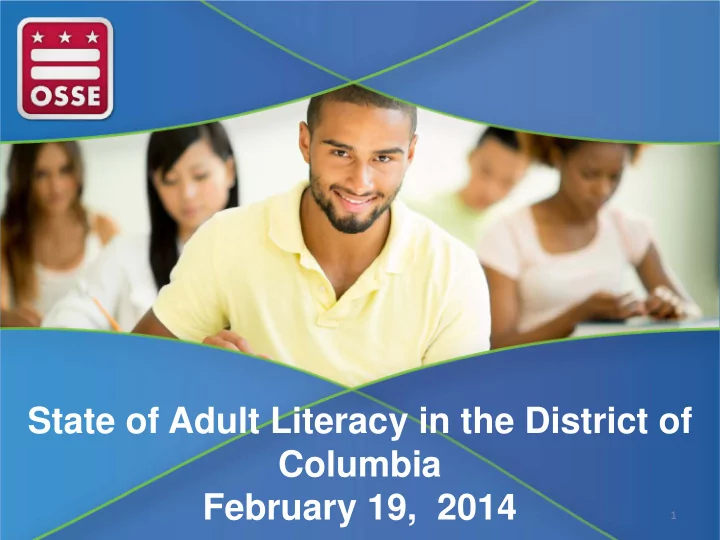

State of Adult Literacy in the District of Columbia February 19, 2014 1
Statistics • Approximately 90,000 District residents read below functional literacy levels. (Source: National Assessment of Adult Literacy 2003) • Nearly 50,139 District residents over 25 do not have a high school diploma or its equivalent. (Source: US Census Bureau, 2012 American Community Survey) • An estimated 81,081 District residents over 25 have a high school diploma but have no postsecondary education. (Source: US Census Bureau, 2012 American Community Survey) • These segments of the District’s population are disproportionally unemployed and systematically being left out of the economic development of the city. 2
Statistics (cont.) • By 2018, digital literacy will be widely required and 71 percent of the job openings in the District will require postsecondary education and/or training. (Source: Carnevale, Smith, and Strohl, 2010) . • To improve the educational levels of the District workforce and lower unemployment, we need to develop and support programs that raise the basic and digital literacy levels of District residents; increase the attainment of high school credentials by DC residents; and help District residents transition to and succeed in postsecondary education or training. 3
Adult Education in the District • AFE Adult Literacy • Currently, other than Providers OSSE AFE data, there is little • Adult Literacy comprehensive Providers student intake, • Adult High Schools assessment, • DOES and WIC performance, subgrantees progress and • Community College outcome data • Libraries available. 4
AFE Participants Program Adult Basic Education Adult Secondary English as a Second Total Type (ABE) Education (ASE) Language (ESL) 1570 (47%) 189 (5%) 1597 (48%) 3356 Gender Female Male Total 1984 (59%) 1372 (41%) 3356 Age 16-18 19-24 25-44 45-59 60+ Total 174 728 1701 626 127 3356 Ethnicity American Asian Black or Hispanic Native White Two Total Indian or African or Latino American or Alaskan American or Other More Pacific Races Islander 7 91 1891 1276 4 73 14 3356 5
AFE Providers Academy of Hope PCS Perry School Anacostia Community Outreach Center So Others Might Eat (SOME) Booker T. Washington PCS VE Program Southeast Ministries Congress Heights Training Center Washington English Center Covenant House Washington Washington Literacy Center Ethiopian Community Center YWCA-NCA The Family Place Literacy Volunteers & Advocates Lt. Joseph P. Kennedy Institute Mary’s Center/Briya PCS National Org. Concerned Black Men Opportunities Industrialization Center- DC 6
Funding •OSSE AFE FY 14 Funding: - $1.25 M (Federal) - $2.8 M (Local) - $1 M (Accelerated Learning - Local) - $5.5 M (ICET - Interagency Collaboration for Education and Training - DOES/OSSE/DHS) • In addition to OSSE, other District agencies receive local and/or federal funding for adult literacy, training and postsecondary education services for District residents. 7
What We Know • While household surveys (NAALS, NALS, PIACC) of a representative sample of residents are helpful, they do not include detailed data about the individual and collective adult literacy needs of most residents. • Therefore, in an effort to assess and address the individual and collective needs of more District residents, the OSSE AFE, DOES and DHS are working together to implement the ICET (Interagency Collaboration for Education and Training) Model . 8
What We’re Doing Now: ICET Model • As part of the ICET (Interagency Collaboration for Education and Training) Model, OSSE/DOES/DHS are collaborating and leveraging resources to offer adult literacy, occupational literacy, digital literacy, training and postsecondary education services to District residents. • Efforts are underway to create uniformity in intake and assessment practices across these three DC government agencies via a single, multi-agency intake form. 9
What We’re Doing Now: ICET Model • OSSE/DOES/DHS will be using the single multi- agency intake form, and administering CASAS eTests and a Learning Disability Screening to District residents to determine their need for adult literacy and other support services as well as their need and readiness for training and/or postsecondary education. • OSSE/DOES/DHS are developing an electronic platform – “data mall” - by which to collect, maintain and share intake, assessment, case management, performance, progress and outcome data for District residents served via ICET. 10
What We’re Doing Now: ICET Model • The ICET model lends itself to additional collaborations with other DC government, public, private and community-based agencies and stakeholders to address the adult literacy, training and postsecondary education needs of District residents. 11
Looking Forward Supply-side Demand-side • MOOCs/Blended Classes • Need for collaboration – Access – Active learning • http://elitedaily.com/news/ – Self-paced world/this-south-african- – Instant Feedback commercial-is-more- – “Gamification” powerful-than-any-super- – Peer interaction bowl-commercial-this- year-video/ 12
Recommend
More recommend